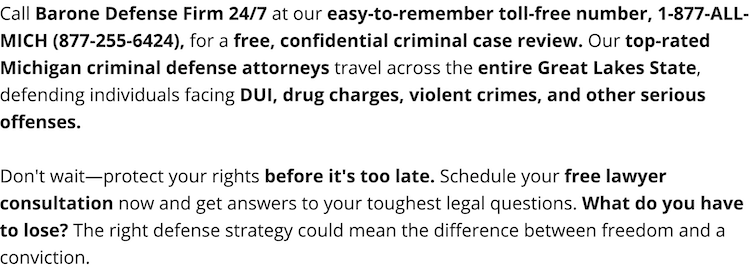Difference Between Force and Deadly Force in Gun Offenses
Anytime a person takes a physical action against another person, they have used force. Depending on the circumstances, the use of both deadly and non-deadly force may be justified.
The use of a legally appropriate level of force is important because if a person uses more force than is reasonably believed to be immediately necessary, that person may not be legally justified in using that level of force. Surprisingly, the words force, deadly force, and non-deadly force are not defined in the Michigan Penal Code. However, the circumstances under which deadly force may be used are defined.
It is important to understand the differences in the levels of force and the circumstances under which Michigan's laws allow the use of each. If you want to know more about the difference between force and deadly force in Michigan gun offenses, speak to a skilled gun attorney that can answer your questions.
Understanding Legal Force
Under Michigan's Self Defense Act, a prerequisite for being able to legally use deadly force is the honest and reasonable belief in an imminent death, great bodily harm, or sexual assault.
This same law further indicates, in § 780.972(2), that an individual may use force other than deadly force against another individual if they honestly and reasonably believes that the use of that force is necessary to defend themselves or another individual from the imminent unlawful use of force by another individual.
What is Deadly Force in Michigan?
Although the legal definition of deadly force seems simple, the applicability of the law relative to what is and is not deadly force is anything but simple. For example, using a gun in a way that does not result in death might still be legally defined as deadly force— so long as the use of the gun was capable of causing death or serious bodily injury.
Use of Deadly Force in Self-Defense or Defense of Others
The primary self-defense statute in Michigan is § 780.972 of the Michigan Penal Code. This section lays out the legal requirements for the justified use of force and deadly force for self-defense. The statute also explains the difference between force and deadly force in gun offenses in Michigan.
Regarding deadly force, this section establishes that a person is legally justified in using deadly force to protect themselves or another person, with no duty to retreat, provided:
- They are not engaged in a crime
- They are in a place they have a right to be (in other words, they are not trespassing)
- They honestly and reasonably believe that deadly force is necessary
- They are preventing imminent death, great bodily harm, or sexual assault to self or others
What is the Role of the Jury in a Deadly Force Case?
The jury decides whether an actor's belief that deadly force is imminently necessary is reasonable and whether that belief was honest and reasonable under the circumstances.
In making these determinations, the jury will be allowed to consider such things as the condition of the people involved, including their relative strength, whether the other person was armed with a dangerous weapon, or had some other means of injuring the defendant.
The Nature of a Person's Alleged Attack
In addition, the jury may consider the nature of the other person's attack or threat and whether the defendant knew about any previous violent acts or threats made by the other person. The jury may also consider whether the defendant knew about any other ways of protecting themselves and may also consider how the excitement of the moment affected the choice made.
If the prosecutor convinces a jury that a person used deadly force when such force was not honestly and reasonably believed to be imminently necessary, a person's use deadly force will not be legally justified and that person will likely be guilty of using unlawful deadly force. If you have been charged with using deadly force, knowing your rights, and the difference between force and deadly force in gun lawsuits in Michigan, can be vital to your defense. Contact a lawyer to learn more.
 Barone Defense Firm Home
Barone Defense Firm Home
















